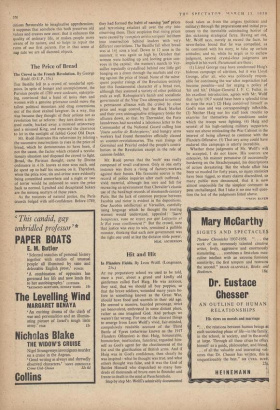The Price of Bread
The Crowd in the French Revolution. By George Rude. (0.U.P., 35s.) THE Bastille fell to a crowd of wonderful opti- mists. In spite of hunger and unemployment, the Parisian people of 1789 were cocksure, enterpris- ing, convinced that a band of noisy men and women with a genuine grievance could move the tallest political mountain and drag concessions out of the Most exalted lawgiver. In a way, this was because they, thought of their actions not as revolution but as reform : they tore down a mis- used castle, hacked away a misused aristocracy and a misused King, and expected the clearance to let in the sunlight of fabled Good Old Days.
Mr. Rudd illustrates this reformism by relating • the successive insurrections to rises in the price of bread, which he demonstrates to have been, if not the cause, the factor which created a revolu- tionary situation and disposed the crowd to fight. Bread, the Parisian thought, came by Divine ordinance in 4 lb. loaves at nine sous each, and he spent up to half his income on it. Therefore, when the price rose, sin and crime were evidently being committed somewhere and a night or two of terror would be unloosed to scare the price back to normal. Lynched and decapitated bakers are the unsung martyrs of those years.
As the restorers of natural justice, the Paris crowds bulged with self-confidence. Before 1789,
they had formed the habit of naming 'just' prices and 'terrorising retailers all over the city into observing them. Their suspicion that rising prices were caused by 'cornplots aristocratiques' led them into insurrection behind leaders with very different convictions. The Bastille fell when bread was at 14i sous a loaf. Down to 12 sous in the summer, it was again so high by October that women were holding up and looting grain con- voys in the capital the women's march to Ver- sailles reputedly crystallised behind one little girl banging on a drum through the markets and cry- ing against the price of bread. None of the subse. quent popular risings of the Revolution entirely lost this fundamental character of a bread riot, although they assumed a variety of other political ends as well. Robespierre's harsh and socialistic 'government of the Year Two attempted to cement a permanent alliance with the crowd by close price and wage control, but the Black Market and their own unimaginative stringency broke the alliance down, so that, by Thermidor, the Paris laundresses had scrawled a laborious letter to the Commander of the National Guard calling him 'foutu satelite de Robespierre,' and hungry arms workers had found themselves officially classed as counter-revolutionaries. The vain risings of Germinal and Prairial ended the people's contri- bution to the Revolution except in the role of cannon-fodder.
Mr. Rude proves that the 'mob' was really composed of small craftsmen. Only in one early instance was there a rising of factory-workers against their. bosses. His favourite source is the record of police inquiries after each outbreak : vivid material, although less sure and full for recreating an environment than Chevalier's classic use of the bankrupt records of nineteenth-century Paris. But the lack of common purpose between Jacobin and rioter is evident in the depositions. One Jacobin intellectual at Versailles, carefully using language which he thought the roaring women would understand, appealed : 'Sucre bougresses, vous ne voyez pas que Lafayette et le Roi vous couillonnent ?" But the crowd, sure that justice was easy to win, remained a gullible monster, thinking that each new government was the right one until at last the dictator stole power.
NEAL ASCHERSON


















































 Previous page
Previous page